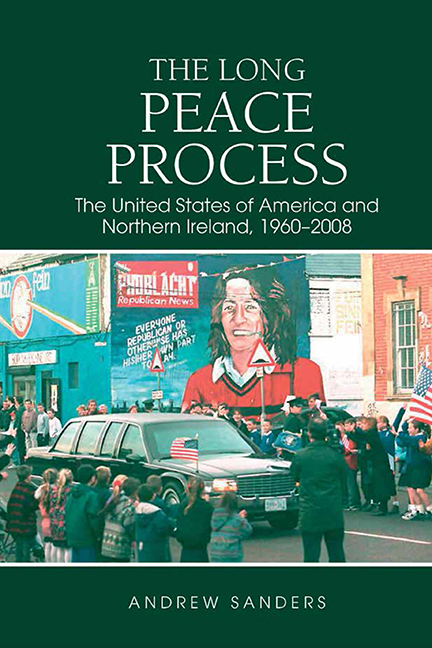Book contents
- Frontmatter
- Contents
- List of Abbreviations
- Acknowledgements
- Introduction
- 1 The USA and Ireland before 1968
- 2 The Early Years of the ‘Troubles’
- 3 Jimmy Carter and the Presidential Statement on Northern Ireland
- 4 Thatcher, Reagan, and Northern Ireland
- 5 The Bush Administration and Northern Ireland as a Local Political Issue
- 6 Bill Clinton and the Path to Good Friday
- 7 George W. Bush, Barack Obama, and Post-Conflict Northern Ireland
- Conclusion
- Select Bibliography
- Index
Introduction
- Frontmatter
- Contents
- List of Abbreviations
- Acknowledgements
- Introduction
- 1 The USA and Ireland before 1968
- 2 The Early Years of the ‘Troubles’
- 3 Jimmy Carter and the Presidential Statement on Northern Ireland
- 4 Thatcher, Reagan, and Northern Ireland
- 5 The Bush Administration and Northern Ireland as a Local Political Issue
- 6 Bill Clinton and the Path to Good Friday
- 7 George W. Bush, Barack Obama, and Post-Conflict Northern Ireland
- Conclusion
- Select Bibliography
- Index
Summary
Gerry Adams is long credited with masterminding the so-called long war and I don't believe that for a minute. I think what Gerry Adams was orchestrating was the long peace process and I think that started in the 70s … They had a lot of patience and they did a lot of planning but as a republican I don't think they did it on their own, I think they had a lot of help.
Marian Price, 1 July 2010The United States will help to secure the tangible benefits of peace … We are proud to support Northern Ireland. You have given America a very great deal … We will stand with those who take risks for peace in Northern Ireland and around the world … We are entering an era of possibility unparalleled in all of human history. If you enter that era determined to build a new age of peace, the United States of America will proudly stand with you.
President Bill Clinton, 30 November 1995Arriving in Belfast, one is met with the iconic image of the Harland and Wolff cranes, known locally as David and Goliath, which tower over the eastern bank of the River Lagan. Edward Harland purchased the Belfast shipyard, which was later responsible for the construction of the Titanic, in 1859. Two years later, Harland took Gustav Wolff on as a partner and by the turn of the century Harland and Wolff employed some 9,000 people. As was the case in other cities throughout the United Kingdom, shipbuilding was very much the iconic industry in early twentieth-century Belfast, but it was not the largest employer; that title belonged to the linen industry.
Linen was synonymous with Belfast at the start of the twentieth century; mid-way through the nineteenth century, Belfast had accounted for half the linen output for all of Ireland and there were twenty-eight linen mills in the city. Just over a third of these were located on the Falls Road, which runs south-west from the city centre towards Andersonstown along the foot of the Black Mountain. Sectarian divisions in Belfast were pronounced in its two main industries: while the shipyards were the preserve of the Protestant working classes, the linen mills provided a steady source of employment to Catholics, many of whom ended up living in houses built and owned by mill owners.
- Type
- Chapter
- Information
- The Long Peace ProcessThe United States of America and Northern Ireland, 1960-2008, pp. 1 - 6Publisher: Liverpool University PressPrint publication year: 2019



